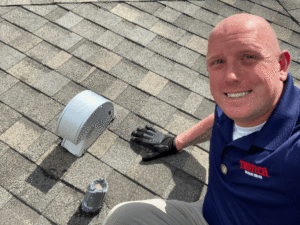Raccoon Removal in Fort Myers, FL
Do you need to get rid of raccoons? We can help!
Some Geographic Restrictions

Raccoons in Fort Myers, FL
Raccoons are strong, resourceful, and excellent climbers. They invade homes looking for a safe place to den that’s close to food and water. A natural raccoon den is in a hollow tree, but the spaces in your home make ideal locations for raccoons. Raccoons are noisy and destructive. Do not wait for them to leave on their own.
As Fort Myers continuously grows, the habitat for raccoons and other wildlife continues to shrink. Raccoons have adapted to live in urban and agricultural habitats. Human habitats have abundant food sources and options for shelter.
Trutech Wildlife Service specializes in raccoon removal in Southwest Florida. In order to remove and control a raccoon or family of raccoons on your property, our wildlife specialist will perform a thorough inspection to ascertain the severity of the raccoon infestation. After the inspection, they will build a custom solution to trap, remove, and seal all entry points. They will also provide warranty options as well as an estimate for preventative services.
Raccoon Control in Fort Myers

Raccoon Trapping
After an exhaustive inspection, a custom raccoon control plan is developed. Live trapping is the most effective and humane way to remove a raccoon. Direct capture is not commonly used because raccoons are a rabies vector species. Relocating trapped raccoons depends on local laws and ordinances. Habitat modification will keep raccoons out of your home after an infestation. Securing garbage cans and keeping pet food inside are simple measures to keep raccoons away.

Raccoon Exclusion
Raccoon exclusion services are the most effective raccoon control. After raccoon removal, it is imperative to seal all entry points to prevent future raccoon problems. Raccoons can squeeze into a four to five inch gaps. When they cannot find a hole big enough, they create it. At Trutech, we install the proper materials on all potential entry points to keep raccoons out.

Remediation and Repair
Raccoons introduce health risks. Raccoon droppings can contain roundworm eggs that are harmful to people and pets. Leptospirosis can spread through raccoon urine. Ectoparasites like fleas and ticks can get into your house from a raccoon. Once the raccoon infestation is controlled, we apply ectoparasite treatments and sanitization agents to restore your house to its original condition. In extreme cases, we replace attic insulation or perform a full attic restoration.
Raccoon Problems

Evidence of Raccoons in Fort Myers
Raccoons are ever recognizable with their black-masked face and nocturnal habits. Mother raccoons may destroy and enter parts of your home, especially your attic, in order to create a suitable place to raise their young.
Raccoon Noises
The most common sign of a raccoon in your house is the noise. Homeowners hear movement noises like thumping and scurrying and vocal sounds. Typical vocalizations include purring, chittering, growling, snarling, hissing, whimpering, and even screeching.
Physical Evidence
For nocturnal critters, spotting a raccoon is rare. Homeowners are more likely to see physical evidence like raccoon tracks and raccoon poop.
Trash cans flipped over and the bags of trash in them destroyed is a telltale sign of a raccoon.

Raccoon Damages
Raccoons are dangerous. If you find one in your home, do not approach it!
When raccoons decide to den in attics, they can cause significant property damage. They can create entry points through soffits, gable vents, roof returns, roof vents, and shingles. Once in your home, they will use available materials like insulation to create dens. They also destroy home gardens, birdfeeders, and make messes of trash cans and garbage bins.
They establish latrine sites that can pose serious health risks if located on your properties. Raccoon feces carries Baylisascaris procyonis (raccoon roundworm) which can spread to people and pets.
In addition to raccoon roundworm, raccoons spread diseases and parasites like rabies, tularemia, giardia, salmonellosis, canine distemper, and leptospirosis.
Ectoparasites like fleas, ticks, lice, and mites can live on raccoons. These parasites can find news hosts once they have been introduced inside your house.
How Trutech Gets Rid of Raccoons
Raccoon in Attic Removal
Raccoons are excellent climbers. They use tree limbs, downspouts, or even siding to gain access to your roof. Once on your roof, entry points include shingles, loose soffits, eaves, vents, or roof returns. Once inside, damage caused by raccoons in the attic includes building dens and creating latrine sites. Both activities destroy the attic’s insulation.
The best way to get rid of a raccoon is a trap. We secure the raccoon trap and set it away from anything you do not want to be destroyed. We place traps in an area where raccoons frequent. Because the raccoon trap needs to be checked, we do place it in a somewhat accessible location.
Raccoon in Chimney Removal
Raccoons commonly nest in chimneys. While many homeowners place specialized caps on their smokestacks for this very reason, raccoons are able to gain entry by removing them manually. As raccoons commonly break into chimneys to raise young, noises like squeaking, purring, rustling, and whining are often heard through the night when infestations are present.
Since the pests become hostile if threatened or cornered, individuals should use extreme caution when confronting raccoons in chimneys. Never open the fireplace to try and catch a raccoon.
We set a trap at the top of the chimney, and if need be, hand remove any juveniles.
Raccoon on Roof Removal
Raccoons often access rooftops by climbing trees, siding, and drainage pipes. Raccoons can establish latrine sites on your roof, and females will search for a more secure place like your attic to give birth.
Preventing raccoon access to roofs is difficult, as these clever creatures can climb up just about any surface, but there are ways our professionals can reduce the odds. From metal flashing and tree trimming, to regular inspections, Trutech Wildlife Service has the experience to repair roof damage and prevent future infestations.
Raccoon Inside the Wall Removal
A female raccoon in the attic can look for more secure places to establish a den. Wall voids are secure and secluded. Homeowners will clearly hear the noises raccoon kits make.
If juveniles are present, raccoon eviction fluid has been effective. Othertimes, the experts at Trutech Wildlife Service will set a trap to catch the female and then hand remove the kits.
Occasionally, a raccoon falls down a wall void and cannot climb out. If you hear the distressed noises of an animal, you will need to remove it as quickly as possible. A trapped raccoon can die
Raccoon in Basement Removal
Basements and crawlspaces are popular places to find nuisance wildlife. Common basement entry points include gaps where utility cables and pipes run into homes, holes near building foundations, open vents, and furnace chimneys. Crawlspaces usually have a simple latch to close the door. Raccoons are smart enough to open that door.
Raccoon in Trash
Raccoons are agile and clever animals that like to break into trash bins for food using any means necessary. They are able to tip over smaller garbage cans and spill the contents on the ground or undo loose-fitting latches and lift unsecured lids to reach inside and pull out trash. Finding trash strewn about lawns is the most damming evidence that raccoons have recently raided garbage bins. Property owners may also find the pest’s distinctive tracks around receptacles.
Some Geographic Restrictions
Frequently Asked Questions
A scared armadillo usually jumps in the air to distract predators or runs away. When facing a human, it is not likely that the pest will bite. Armadillos have small, peg-like teeth that do not usually cause injury.
Because the pests are docile and frighten easily, armadillos are not dangerous to humans. However, these animals may cause problems by digging near foundations or damaging gardens. Residents with armadillo issues can call Trutech for safe pest removal.
Because of the danger of disease, homeowners should not try to dispose of dead armadillos on their own. As with any wild animal, handling these pests is safest with the proper equipment and training. Residents with concerns about armadillos can contact the wildlife experts at Trutech.
Burrowing animals are definitely attracted to old hollowed out tree stumps. To determine the species an inspection would be needed, because multiple burrowing animals would be attracted to that area. Example. Armadillo, Raccoon, Skunk, etc. If you were seeing areas around the tree stump or in your yard that have been rooted up, then the target animal may be Armadillos.
Armadillos thrive in warm, subtropical climates. Cold weather can wipe out an entire armadillo population. You are most likely to find armadillos in warm southern cities like Dallas, San Antonio, Orlando, Tampa, Charleston, Savannah, and Hilton Head.
Stay Up to Date with Seasonal Nuisance Wildlife from Trutech Wildlife
Subcribe to our wildlife newsletter.


